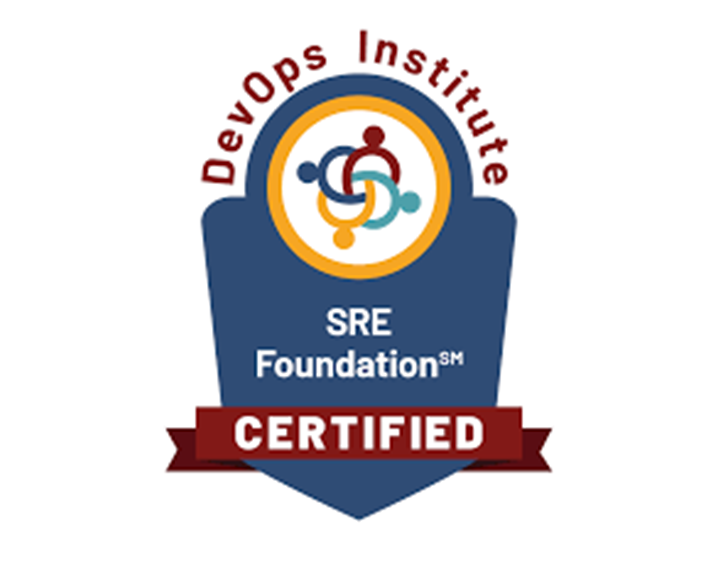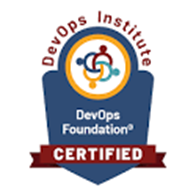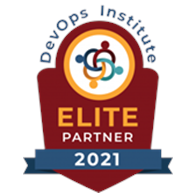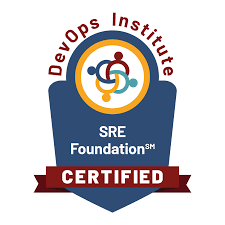IT15B02: SITE RELIABILITY ENGINEERING FOUNDATION (SF)

SITE RELIABILITY ENGINEERING FOUNDATION (SF)
Course Duration
Mode of Assessment
- Students will be required to complete and pass an online assessment during class.
- External Certification Exam
After registration, students will receive a DevOps exam voucher 3 days before the date of course commencement from NTUC LHUB. After completing the course with 75% attendance achieved, students can proceed to register and sit for the official “DevOps Site Reliability Engineering Foundation” exam on DevOps Institute online portal. Students must complete the exam within the validity date of the exam voucher.
DevOps Site Reliability Engineering Foundation Exam Details
No. of Questions: 40
Question Format: Multiple-choice
Exam Duration: 60 minutes
Passing Score: 26 out of 40 (65%)
Who Should Attend
Individuals starting or leading a move towards increased reliability • Individuals interested in modern IT leadership and organizational change approaches • Business Managers & Stakeholders • Consultants • Change Agents • DevOps Practitioners • IT Directors • IT and Business Management Developers • Product Owners • Scrum Masters • Software Engineers • Site Reliability Engineers • System Integrators • Tool Providers
Course Overview


Site Reliability Engineering (SRE) is a discipline that incorporates aspects of software engineering and applies them to infrastructure and operations problems. The goal is to create ultra-scalable and highly reliable distributed software systems.
This course is an introduction to the principles & practices that enable an organization to reliably and economically scale critical services. Introducing a site-reliability dimension requires organizational re-alignment, a new focus on engineering & automation, and the adoption of a range of new working paradigms.
Course Schedule
Next available schedule
Course Objectives
Upon completing this course, participants will achieve an understanding of:
- The history of SRE and its emergence at Google
- The inter-relationship of SRE with DevOps and other popular frameworks
- The underlying principles behind SRE
- Service Level Objectives (SLO’s) and their user focus
- Service Level Indicators (SLI’s) and the modern monitoring landscape
- Error budgets and the associated error budget policies
- Toil and its effect on an organization’s productivity
- Some practical steps that can help to eliminate toil
- Observability as something to indicate the health of a service
- SRE tools, automation techniques and the importance of security
- Anti-fragility, our approach to failure and failure testing
- The organizational impact that introducing SRE bring
Pre-requisites
Knowledge, Skills & Experience
- Prior knowledge of DevOps, which can be achieved by attending:
-
- IT14A05 - DevOps Foundation
-
- It is recommended that participants have prior working experience or knowledge in IT software development or IT industry operations.
- Hardware & Software
This course will be conducted as a Virtual Live Class (VLC) via Zoom platform. Participants must own a zoom account and have a laptop or a desktop with “Zoom Client for Meetings” installed. This can be downloaded from https://zoom.us/download
|
System Requirement |
|
Must Have: Please ensure that your computer or laptop meets the following requirements.
Good to Have:
Not Recommended: |
Course Outline
Module 1: SRE Principles & Practices
- What is Site Reliability Engineering?
- SRE & DevOps: What is the Difference?
- SRE Principles & Practices
Module 2: Service Level Objectives & Error Budgets
- Service Level Objectives (SLO’s)
- Error Budgets & Error Budget Policies
Module 3: Reducing Toil
- What is Toil?
- Why is Toil Bad?
- Doing Something About Toil
Module 4: Monitoring & Service Level Indicators
- Service Level Indicators (SLI’s)
- Monitoring & Observability
Module 5: SRE Tools & Automation
- Automation Focus
- Hierarchy of Automation Types
- Secure Automation
- Automation Tools
Module 6: Anti-Fragility & Learning from Failure
- Why Learn from Failure
- Benefits of Anti-Fragility
- Shifting the Organizational Balance
Module 7: Organizational Impact of SRE
- Why Organizations Embrace SRE
- Patterns for SRE Adoption
- Sustainable Incident Response
- Blameless Post-Mortems
- SRE & Scale
Module 8: SRE, Other Frameworks, Trends
- SRE & Other Frameworks
- SRE Evolution
- Additional Sources of Information
Certificate Obtained and Conferred by
- Certificate of Completion from NTUC LearningHub
Upon meeting at least 75% attendance and passing the assessment(s), participants will receive a Certificate of Completion from NTUC LearningHub.
- Statement of Attainment (SOA) from SkillsFuture Singapore
After passing the assessment(s), participants will receive a SOA from SkillsFuture Singapore, certifying that they have achieved the following Competency Standard(s): - ICT-DIT-3011-1.1 Quality Engineering
- External Certification
After completing this course and passing the official “DevOps Site Reliability Engineering Foundation” certification exam, candidates will receive a Certified Site Reliability Engineering Foundation certification from DevOps Institute. The certification is governed and maintained by DevOps Institute.
You will be awarded with the following digital badge(s) upon passing the official DevOps Site Reliability Engineering Foundation exam:

Additional Details
Medium of Instruction: English
Trainer to trainee ratio: 1:20
Mode of Delivery: Virtual Live Class (VLC) via Zoom or Physical class (F2F)
Courseware: Learner’s Resources on DevOps Institute Portal
Price
|
Course Fee and Government Subsidies |
||||||
|
|
Individual Sponsored |
Company Sponsored |
||||
|
Non-SME |
SME |
|||||
|
Before GST |
After GST |
Before GST |
After GST |
Before GST |
After GST |
|
|
Full Course Fee (For Foreigners and those not eligible for subsidies) |
$ 1,400.00 |
$ 1,526.00 |
$ 1,400.00 |
$ 1,526.00 |
$ 1,400.00 |
$ 1,526.00 |
|
For Singapore Citizens aged 39 and below and For all Singapore Permanent Residents (The minimum age for individual sponsored trainees is 21 years) |
$ 700.00 |
$ 826.00 |
$ 700.00 |
$ 826.00 |
$ 420.00 |
$ 546.00 |
|
For Singapore Citizens aged 40 years and above |
$ 420.00 |
$ 546.00 |
$ 420.00 |
$ 546.00 |
$ 420.00 |
$ 546.00 |
Funding Eligibility Criteria
|
Individual Sponsored Trainee |
Company Sponsored Trainee |
|
|
Remarks
|
Company Sponsored Trainee |
|
|
SkillsFuture Credit:
PSEA:
|
Absentee Payroll (AP) Funding:
|
Terms & Conditions apply. NTUC LearningHub reserves the right to make changes or improvements to any of the products described in this document without prior notice.
Prices are subject to other LHUB miscellaneous fees.
| Batch ID | Course Period | Course Title | Funding Available |
Duration (Hours) |
Session (Hours) |
Venue | Available Seats |
Online Payment |
|---|
What Others Also Enrolled In

DEVOPS HANDS-ON TRAINING (TERRAFORM, JENKINS, GITHUB, SONARQUBE) (SF)
View detail



